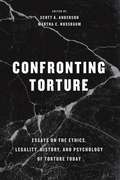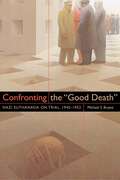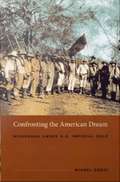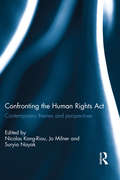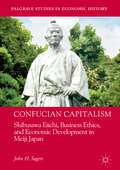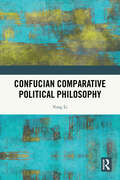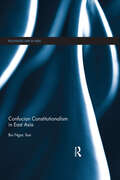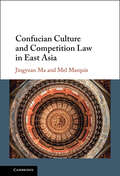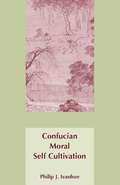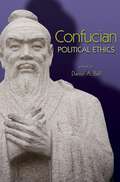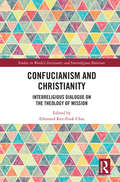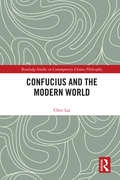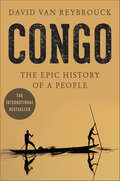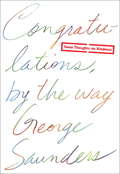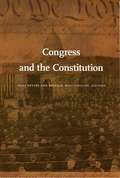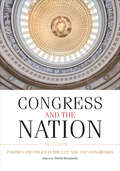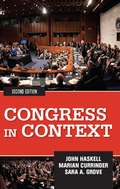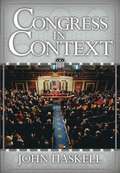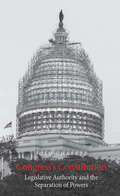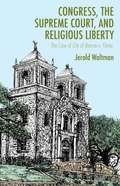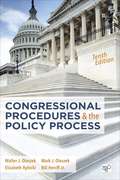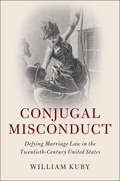- Table View
- List View
Confronting Torture: Essays on the Ethics, Legality, History, and Psychology of Torture Today
by Martha C. Nussbaum Scott A. AndersonTorture has lately become front page news, featured in popular movies and TV shows, and a topic of intense public debate. It grips our imagination, in part because torturing someone seems to be an unthinkable breach of humanity—theirs and ours. And yet, when confronted with horrendous events in war, or the prospect of catastrophic damage to one’s own country, many come to wonder whether we can really afford to abstain entirely from torture. Before trying to tackle this dilemma, though, we need to see torture as a multifaceted problem with a long history and numerous ethical and legal aspects.Confronting Torture offers a multidisciplinary investigation of this wrenching topic. Editors Scott A. Anderson and Martha C. Nussbaum bring together a diversity of scholars to grapple with many of torture’s complexities, including: How should we understand the impetus to use torture? Why does torture stand out as a particularly heinous means of war-fighting? Are there any sound justifications for the use of torture? How does torture affect the societies that employ it? And how can we develop ethical or political bulwarks to prevent its use? The essays here resist the temptation to oversimplify torture, drawing together work from scholars in psychology, history, sociology, law, and philosophy, deepening and broadening our grasp of the subject. Now, more than ever, torture is something we must think about; this important book offers a diversity of timely, constructive responses on this resurgent and controversial subject.
Confronting the "Good Death": Nazi Euthanasia on Trial, 1945-1953 (G - Reference,information And Interdisciplinary Subjects Ser.)
by Michael S. BryantYears before Hitler unleashed the “Final Solution” to annihilate European Jews, he began a lesser-known campaign to eradicate the mentally ill, which facilitated the gassing and lethal injection of as many as 270,000 people and set a precedent for the mass murder of civilians. In Confronting the “Good Death” Michael Bryant analyzes the U.S. government and West German judiciary’s attempt to punish the euthanasia killers after the war. The first author to address the impact of geopolitics on the courts’ representation of Nazi euthanasia, Bryant argues that international power relationships wreaked havoc on the prosecutions. Drawing on primary sources, this provocative investigation of the Nazi campaign against the mentally ill and the postwar quest for justice will interest general readers and provide critical information for scholars of Holocaust studies, legal history, and human rights. Support for this publication was generously provided by the Eugene M. Kayden Fund at the University of Colorado.
Confronting the American Dream: Nicaragua Under U.S. Imperial Rule
by Michel GobatMichel Gobat deftly interweaves political, economic, cultural, and diplomatic history to analyze the reactions of Nicaraguans to U. S. intervention in their country from the heyday of Manifest Destiny in the mid-nineteenth century through the U. S. occupation of 1912-33. Drawing on extensive research in Nicaraguan and U. S. archives, Gobat accounts for two seeming paradoxes that have long eluded historians of Latin America: that Nicaraguans so strongly embraced U. S. political, economic, and cultural forms to defend their own nationality against U. S. imposition and that the country's wealthiest and most Americanized elites were transformed from leading supporters of U. S. imperial rule into some of its greatest opponents. Gobat focuses primarily on the reactions of the elites to Americanization, because the power and identity of these Nicaraguans were the most significantly affected by U. S. imperial rule. He describes their adoption of aspects of "the American way of life" in the mid-nineteenth century as strategic rather than wholesale. Chronicling the U. S. occupation of 1912-33, he argues that the anti-American turn of Nicaragua's most Americanized oligarchs stemmed largely from the efforts of U. S. bankers, marines, and missionaries to spread their own version of the American dream. In part, the oligarchs' reversal reflected their anguish over the 1920s rise of Protestantism, the "modern woman," and other "vices of modernity" emanating from the United States. But it also responded to the unintended ways that U. S. modernization efforts enabled peasants to weaken landlord power. Gobat demonstrates that the U. S. occupation so profoundly affected Nicaragua that it helped engender the Sandino Rebellion of 1927-33, the Somoza dictatorship of 1936-79, and the Sandinista Revolution of 1979-90.
Confronting the Human Rights Act 1998: Contemporary themes and perspectives
by Suryia Nayak Nicolas Kang-Riou Jo MilnerThis book critically examines the Human Rights Act 1998 (HRA) and evaluates its impact from a multi-disciplinary perspective. The book includes both a domestic and international analysis of the effectiveness of the HRA, and also considers possible future developments in policy and practise as well as contemplating the potential for a British Bill of Rights. The editors have collected pieces from contributors drawn from diverse spheres, all of whom are internationally recognised for their impact in the field of human rights law. Contributors include members of the bench in the United Kingdom and Australia, academics, researchers, members of NGOs, and campaigners as well as people’s testimony of lived experiences in relation to the Human Rights Act. Valuable contributions from the likes of Costas Douzinas, Keith Ewing, Helen Fenwick, Lady Hale, Irene Khan, Michael Kirby, Francesca Klug, Peter Tatchell and others have resulted in a book which draws out the connections between legal framework, theory, and the actual experience of the protection afforded to groups and individuals by the HRA. Confronting the Human Rights Act 1998 will be of particular interest to scholars and students of Law, International Studies and Political Science.
Confucian Capitalism: Shibusawa Eiichi, Business Ethics, and Economic Development in Meiji Japan (Palgrave Studies in Economic History)
by John H. SagersWith the life story of Shibusawa Eiichi (1840–1931), one of the most important financiers and industrialists in modern Japanese history, as its narrative focal point, this book explores the challenges of importing modern business enterprises to Japan, where the pursuit of profit was considered beneath the dignity of the samurai elite. Seeking to overturn the Tokugawa samurai-dominated political economy after the Meiji Restoration, Shibusawa was a pioneer in introducing joint-stock corporations to Japan as institutions of economic development. As the entrepreneurial head of Tokyo’s Dai-Ichi Bank, he helped launch modern enterprises in such diverse industries as banking, shipping, textiles, paper, beer, and railroads. Believing businesses should be both successful and serve the national interest, Shibusawa regularly cautioned against the pursuit of profit alone. He insisted instead on the ‘unity of morality and economy’ following business ethics derived from the Confucian Analects. A top leader in Japan’s business community for decades, Shibusawa contributed to founding the Tokyo Stock Exchange, the Tokyo Chamber of Commerce, and numerous educational and philanthropic organizations to promote his vision of Confucian capitalism. This volume marks an important contribution to the international debate on the extent to which capitalist enterprises have a responsibility to serve and benefit the societies in which they do business. Shibusawa's story demonstrates that business, government, trade associations, and educational institutions all have valuable roles to play in establishing a political economy that is both productive and humane.
Confucian Comparative Political Philosophy
by Yong LiThis book conducts a comparative study between Confucian political philosophy and contemporary political philosophy in the analytic tradition.The author demonstrates the relevance of Confucianism to contemporary discussions on important political ideals, such as equality, democracy, human rights, perfectionism, and global justice. He also introduces individual Confucian thinkers, including both historical figures like Kongzi, Mengzi, and Xunzi, and contemporary thinkers such as Kang Youwei and Mou Zongsan. By arguing whether certain Confucian ideals can broaden current debates in political philosophy, the book moves the discussion further.The book will appeal to graduate students and scholars studying ethics, political philosophy, and Chinese philosophy.
Confucian Constitutionalism in East Asia (Routledge Law in Asia)
by Bui Ngoc SonWestern liberal constitutionalism has expanded recently, with, in East Asia, the constitutional systems of Japan, South Korea and Taiwan based on Western principles, and with even the socialist polities of China and Vietnam having some regard to such principles. Despite the alleged universal applicability of Western constitutionalism, however, the success of any constitutional system depends in part on the cultural values, customs and traditions of the country into which the constitutional system is planted. This book explains how the values, customs and traditions of East Asian countries are Confucian, and discusses how this is relevant to constitutional practice in the region. The book outlines how constitutionalism has developed in East Asia over a long period, considers different scholarly work on the ease or difficulty of integrating Western constitutionalism into countries with a Confucian outlook, and examines the prospects for such integration going forward. Throughout, the book covers detailed aspects of Confucianism and the workings of constitutions in practice.
Confucian Culture and Competition Law in East Asia
by Mel Marquis Jingyuan MaCompetition law is a significant legal transplant in East Asia, where it has come into contact with deeply rooted variants of Confucian culture. This timely volume analyses cultural factors in mainland China, Japan and Korea, focusing on their shared but diversely evolved Confucian heritage. These factors distinguish the competition law systems of these countries from those of major western jurisdictions, in terms of the goals served by the law, the way enforcement is structured, and the way subjects of the law respond to it. Concepts from cultural studies inform a new and eclectic perspective on these dynamics, with the authors also drawing on ideas from law and economics, comparative law, East Asian studies, political science, business management and ethics, and institutional economics. The volume presents a model for cultural analysis of comparative legal topics and contributes to a greater understanding of the challenges to deeper convergence of competition laws between East and West.
Confucian Moral Self Cultivation (Second Edition)
by Phillip J. IvanhoeA concise and accessible introduction to the evolution of the concept of moral self-cultivation in the Chinese Confucian tradition, this volume begins with an explanation of the pre-philosophical development of ideas central to this concept, followed by an examination of the specific treatment of self cultivation in the philosophy of Kongzi ("Confucius"), Mengzi ("Mencius"), Xunzi, Zhu Xi, Wang Yangming, Yan Yuan and Dai Zhen. In addition to providing a survey of the views of some of the most influential Confucian thinkers on an issue of fundamental importance to the tradition, Ivanhoe also relates their concern with moral self-cultivation to a number of topics in the Western ethical tradition. Bibliography and index are included.
Confucian Political Ethics (Ethikon Series in Comparative Ethics)
by Daniel A. BellFor much of the twentieth century, Confucianism was condemned by Westerners and East Asians alike as antithetical to modernity. Internationally renowned philosophers, historians, and social scientists argue otherwise in Confucian Political Ethics. They show how classical Confucian theory--with its emphasis on family ties, self-improvement, education, and the social good--is highly relevant to the most pressing dilemmas confronting us today. Drawing upon in-depth, cross-cultural dialogues, the contributors delve into the relationship of Confucian political ethics to contemporary social issues, exploring Confucian perspectives on civil society, government, territorial boundaries and boundaries of the human body and body politic, and ethical pluralism. They examine how Confucianism, often dismissed as backwardly patriarchal, can in fact find common ground with a range of contemporary feminist values and need not hinder gender equality. And they show how Confucian theories about war and peace were formulated in a context not so different from today's international system, and how they can help us achieve a more peaceful global community. This thought-provoking volume affirms the enduring relevance of Confucian moral and political thinking, and will stimulate important debate among policymakers, researchers, and students of politics, philosophy, applied ethics, and East Asian studies. The contributors are Daniel A. Bell, Joseph Chan, Sin Yee Chan, Chenyang Li, Richard Madsen, Ni Lexiong, Peter Nosco, Michael Nylan, Henry Rosemont, Jr., and Lee H. Yearley.
Confucianism and Christianity: Interreligious Dialogue on the Theology of Mission (Studies in World Christianity and Interreligious Relations)
by Edmund Kee-Fook ChiaThis book reflects on three broad themes of Confucian-Christian relations to assist in the appreciation of the church’s theology of mission. While the themes of this volume are theological in orientation, the dialogue is engaged in from an interdisciplinary approach that prioritises the act of listening. Part I surveys the historical background necessary for an adequate understanding of the contemporary Confucian-Christian dialogues. It examines the history of Confucian-Christian relations, explores the Chinese Rites Controversy, and delineates the contemporary task of indigenizing Christianity by Sino-Christian theologians. Part II compares elements in the Confucian and Christian traditions that exemplify the epitome and fullness of spiritual development. It discusses the Confucian practice of rites (li), interrogates how the noble or exemplary person (junzi) competes, and outlines the Confucian understanding of sageliness (shengren). Lastly, Part III examines different aspects of the church’s engagements with the world outside of itself. It advocates for a Confucian-Christian hermeneutic of moral goodness, attends to the Confucian emphasis on moral self-cultivation, proposes that Confucian virtue ethics can shed light on Christian moral living, and offers a Confucian-Christian understanding of care for mother earth. This book is ideally suited to lecturers and students of both Christian studies and Confucian studies, as well as those engaged in mission studies and interfaith studies. It will also be a valuable resource for anyone interested in comparative religious and theological studies on Christianity and Confucianism.
Confucius and the Modern World (Routledge Studies in Contemporary Chinese Philosophy)
by Lai ChenThis book represents the cutting edge of theoretical works on Confucianism. Starting from Confucianism’s comeback in modern China and ending with the proposal of the new philosophical concept of “multiple universality” in the face of the world culture, the author conducts an in-depth analysis and discussion of many facets of the relationship between Confucianism, Confucian traditions and the modern world culture. <P><P> It has a focused theme and a strong sense of contemporaneity, and responds to the current challenges confronting Confucianism from the perspective of modern culture. The chapters not only elucidate the Confucian position in the face of challenges of global ethics, dialogues on human rights, and ecological civilization, but also provide a modern interpretation of classical Confucian ideas on education, politics and ritual politics as well as an analysis of the development of modern Confucianism. All in all, this work is a comprehensive exposition of the Confucian values and their modern implications.
Congo: The Epic History of a People
by David Van Reybrouck“A magnificent, epic look at the history of the region. . . . A monumental contribution to the annals of Congo scholarship” (Christian Science Monitor).The International BestsellerFrom the beginnings of the slave trade through colonization, the struggle for independence, Mobutu's brutal three decades of rule, and the civil war that has raged from 1996 to the present day, Congo: The Epic History of a People traces the history of one of the most devastated nations in the world. Esteemed scholar David Van Reybrouck balances hundreds of interviews with a diverse range of Congolese with meticulous historical research to construct a multidimensional portrait of a nation and its people.Epic in scope yet eminently readable, both penetrating and deeply moving, Congo—a finalist for the Cundill Prize—takes a deeply humane approach to political history, focusing squarely on the Congolese perspective, and returns a nation’s history to its people.“A compelling mixture of literary and oral history that delivers an authentic story of how European colonialism, African resistance, and the endless exploitation of natural resources affected the lives of the Congolese.” —Booklist“A vivid panorama of one of the most tormented lands in the world.” —Washington Post
Congratulations, by the way: Some Thoughts on Kindness
by George SaundersThree months after George Saunders gave a convocation address at Syracuse University, a transcript of that speech was posted on the website of The New York Times, where its simple, uplifting message struck a deep chord. Within days, it had been shared more than one million times. Why? Because Saunders's words tap into a desire in all of us to lead kinder, more fulfilling lives. Powerful, funny, and wise, Congratulations, by the way is an inspiring message from one of today's most influential and original writers.From the Hardcover edition.
Congress and Policy Making in the 21st Century
by Jenkins Patashnik Eric M. Jeffery A.Congress is frequently said to be 'broken', 'dysfunctional', and 'weak', but how does the contemporary Congress really work? Does Congress have the capacity to solve major policy problems? Can it check an aggrandizing executive, oversee a powerful Federal Reserve, and represent the American people? Can Congress cope with vast changes in the American political economy, including rising income inequality? Congress and Policy Making in the 21st Century takes a fresh look at the performance of Congress in the domestic arena, focusing on issues such as immigration, health care, and the repeal of 'Don't Ask, Don't Tell'. With original contributions from leading scholars, this important volume examines how Congress tackles - and fails to tackle - key policy challenges in an era of growing social diversity and ideological polarization. Rich in analysis and illuminating detail, the book reveals the full complexity of the institution at work.
Congress and the Constitution
by Keith E. Whittington Neal DevinsFor more than a decade, the U. S. Supreme Court has turned a skeptical eye toward Congress. Distrustful of Congress's capacity to respect constitutional boundaries, the Court has recently overturned federal legislation at a historically unprecedented rate. This intensified judicial scrutiny highlights the need for increased attention to how Congress approaches constitutional issues. In this important collection, leading scholars in law and political science examine the role of Congress in constitutional interpretation, demonstrating how to better integrate the legislative branch into understandings of constitutional practice. Several contributors offer wide-ranging accounts of the workings of Congress. They look at lawmakers' attitudes toward Congress's role as a constitutional interpreter, the offices within Congress that help lawmakers learn about constitutional issues, Congress's willingness to use its confirmation power to shape constitutional decisions by both the executive and the courts, and the frequency with which congressional committees take constitutional questions into account. Other contributors address congressional deliberation, paying particular attention to whether Congress's constitutional interpretations are sound. Still others examine how Congress and the courts should respond to one another's decisions, suggesting how the courts should evaluate Congress's work and considering how lawmakers respond to Court decisions that strike down federal legislation. While some essayists are inclined to evaluate Congress's constitutional interpretation positively, others argue that it could be improved and suggest institutional and procedural reforms toward that end. Whatever their conclusions, all of the essays underscore the pervasive and crucial role that Congress plays in shaping the meaning of the Constitution. Contributors. David P. Currie, Neal Devins, William N. Eskridge Jr. . John Ferejohn, Louis Fisher, Elizabeth Garrett, Michael J. Gerhardt, Michael J. Klarman, Bruce G. Peabody, J. Mitchell Pickerill, Barbara Sinclair, Mark Tushnet, Adrian Vermeule, Keith E. Whittington, John C. Yoo
Congress and the Nation 2017-2020, Volume XV: Politics and Policy in the 115th and 116th Congresses
by David HosanskyChronicling the polarized partisan environment during the President Donald Trump’s term, Congress and the Nation 2017-2020, Vol. XV will be the most authoritative reference on congressional lawmaking and trends during the 115th and 116th Congresses. Congress and the Nation is a unique reference product, rivaled only by the annual editions of the CQ Almanac in its coverage of the legislative and policymaking activities of the U.S. national legislature. After its original publication in the mid-1960s in a one-volume work covering 20 years (1945-1965) of lawmaking, the succeeding editions (vols. II – XIII) have been focused on 4 years of lawmaking activity under succeeding presidential administrations. Each new quadrennial edition is organized into 14 policy-centered chapters (economy, homeland security [since vol. XI], foreign policy, defense policy, energy and environment, health, etc.) and two chapters that cover matters internal to Congress and the presidential administration. The policy chapters cover the major legislative activities in the two numbered congresses convened during the four year period. The result is a narrative and analytical account of the lawmaking by the U.S. Congress that provides students, scholars and journalists with a digestible and accurate retrospective accounts difficult to find or reconstruct from news media, as well as longer term historical perspective of congressional lawmaking. This is a landmark series for CQ Press that has proven its value among librarians for decades
Congress and the Nation 2017-2020, Volume XV: Politics and Policy in the 115th and 116th Congresses
by David HosanskyChronicling the polarized partisan environment during the President Donald Trump’s term, Congress and the Nation 2017-2020, Vol. XV will be the most authoritative reference on congressional lawmaking and trends during the 115th and 116th Congresses. Congress and the Nation is a unique reference product, rivaled only by the annual editions of the CQ Almanac in its coverage of the legislative and policymaking activities of the U.S. national legislature. After its original publication in the mid-1960s in a one-volume work covering 20 years (1945-1965) of lawmaking, the succeeding editions (vols. II – XIII) have been focused on 4 years of lawmaking activity under succeeding presidential administrations. Each new quadrennial edition is organized into 14 policy-centered chapters (economy, homeland security [since vol. XI], foreign policy, defense policy, energy and environment, health, etc.) and two chapters that cover matters internal to Congress and the presidential administration. The policy chapters cover the major legislative activities in the two numbered congresses convened during the four year period. The result is a narrative and analytical account of the lawmaking by the U.S. Congress that provides students, scholars and journalists with a digestible and accurate retrospective accounts difficult to find or reconstruct from news media, as well as longer term historical perspective of congressional lawmaking. This is a landmark series for CQ Press that has proven its value among librarians for decades
Congress and the Politics of Problem Solving
by E. Scott Adler John D. WilkersonHow do issues end up on the agenda? Why do lawmakers routinely invest in program oversight and broad policy development? What considerations drive legislative policy change? For many, Congress is an institution consumed by partisan bickering and gridlock. Yet the institution's long history of addressing significant societal problems – even in recent years – seems to contradict this view. Congress and the Politics of Problem Solving argues that the willingness of many voters to hold elected officials accountable for societal conditions is central to appreciating why Congress responds to problems despite the many reasons mustered for why it cannot. The authors show that, across decades of policy making, problem-solving motivations explain why bipartisanship is a common pattern of congressional behavior and offer the best explanation for legislative issue attention and policy change.
Congress in Context
by John Haskell Marian Currinder Sara A. GroveThe U. S. Congress is by the far the least popular--and most misunderstood--branch of the federal government. Congress in Context de-mystifies the institution, giving students a comprehensive and practical understanding of Congress and the legislative process. This book takes a different approach to the study of Congress than other texts. Usually Congress is treated in isolation from the rest of the government. But the Framers of the Constitution explicitly intended for the branches of government to be interdependent. Congress in Context introduces readers to Congress’s critical role in the context of this interdependent system. Using the metaphor of a board of directors, the authors explain the three key roles of Congress within the federal government--authorizing what government does, funding its activities, and supervising how it carries out the laws Congress passes--and shows students how Congress interacts with the rest of the government to exercise these powers. The thoroughly expanded and revised second edition features brand-new chapters on Congress and the courts and Congress and interest groups. It also includes expanded coverage of Congress’s relationship with the executive branch, campaign finance, and today’s major budget issues. Grounded in the latest political science literature coupled with contemporary examples, Congress in Context offers students an informed yet accessible introduction to how the legislative branch carries out its duties.
Congress in Context
by John HaskellA concise and engaging introduction to the workings of Congress, from directing government actions through legislation and oversight to interacting with the executive branch in a separated system of government.
Congress's Constitution: Legislative Authority and the Separation of Powers
by Josh ChafetzA leading scholar of Congress and the Constitution analyzes Congress’s surprisingly potent set of tools in the system of checks and balances. Congress is widely supposed to be the least effective branch of the federal government. But as Josh Chafetz shows in this boldly original analysis, Congress in fact has numerous powerful tools at its disposal in its conflicts with the other branches. These tools include the power of the purse, the contempt power, freedom of speech and debate, and more. Drawing extensively on the historical development of Anglo-American legislatures from the seventeenth century to the present, Chafetz concludes that these tools are all means by which Congress and its members battle for public support. When Congress uses them to engage successfully with the public, it increases its power vis-à-vis the other branches; when it does not, it loses power. This groundbreaking take on the separation of powers will be of interest to both legal scholars and political scientists.
Congress, the Supreme Court, and Religious Liberty
by Jerold WaltmanIn the case City of Boerne v. Flores, the Supreme Court struck down the Religious Freedom Restoration Act of 1993. Waltman offers the first book-length analysis of the act to show how this case contributes to an intense legal debate still ongoing today: Can and should the Supreme Court be the exclusive interpreter of the Constitution?
Congressional Procedures and the Policy Process (Tenth Edition)
by Walter J. Oleszek Mark J. Oleszek Elizabeth Rybicki Bill HeniffThis book reveals how the majority and minority parties use procedural devices to achieve their political goals and offers an assessment of the role of conference committees in reconciling bicameral differences. Not shying away from the complexity of the topic, Oleszek and new co-authors Mark Oleszek, Elizabeth Rybicki, and William Heniff ensure that the machinations of Congress are understandable through an array of interesting examples, topical cases, and anecdotes that they are well-positioned to witness and experience first-hand.
Conjugal Misconduct: Defying Marriage Law in the Twentieth-Century United States (Cambridge Historical Studies in American Law and Society)
by William KubyConjugal Misconduct reveals the hidden history of controversial and legally contested marital arrangements in twentieth-century America. William Kuby examines the experiences of couples in unconventional unions and the legal and cultural backlash generated by a wide array of 'alternative' marriages. These include marriages established through personal advertisements and matchmaking bureaus, marriages that defied state eugenic regulations, hasty marriages between divorced persons, provisional and temporary unions referred to as 'trial marriages', racial intermarriages, and a host of other unions that challenged sexual and marital norms. In illuminating the tensions between those who set marriage policies and those who defied them, Kuby offers a fresh account of marriage's contested history, arguing that although marital nonconformists composed only a small minority of the population, their atypical arrangements nonetheless shifted popular understandings of marriage and consistently refashioned the legal parameters of the institution.
